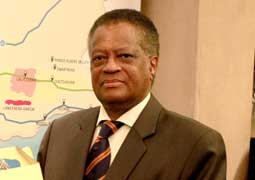
Since the establishment of the Office on Institutions Supporting Democracy (ISDs), there has been a discernible improvement in the relationship between Parliament and the institutions, according to the Speaker of the National Assembly Mr Max Sisulu.
The Speaker met the leaders of Chapter 9 institutions in Parliament today (Wednesday 30 October): the six Institutions created in terms of the Constitution to support democracy are the Auditor-General, the Commission for Gender Equality, the Electoral Commission, the Public Protector, the South African Human Rights Commission, and the Commission for the Promotion and Protection of the Rights of Cultural, Religious and Linguistic Communities.
Thanking the Deputy Speaker of the National Assembly Ms NomaIndiya Mfeketo and the team of the Office on ISDs for their hard work on improving the working relationship between Parliament and the ISDs, Mr Sisulu said a central point had been ensured to co-ordinate the work of the ISDs with that of Parliament.
"As in any other relationship, all of us need to commit to work harder to ensure that the relationship works well, for all of our benefit," he added.
The issues that were discussed included the relationship between the ISDs and Parliament, a funding model for the ISDs and the processing of the report of the ad-hoc Committee on Chapter 9 Institutions.
Mr Sisulu said he wanted to correct the media-driven impression that Parliament was interfering in the work of certain ISDs by prescribing to them on how to carry out their mandates.
"Parliament's involvement with the functioning of any organ of state is based on fulfilment of our oversight function which is based on section 55 subsection 2 (b) empowering the National Assembly to maintain oversight of any organ of state" he said.
The importance of the implementation of the recommendations contained in the Kader Asmal Report on Chapter 9 Institutions was highlighted by ISD heads.
The ISD heads flagged certain issues, including their funding, the failure of Parliament to give feedback to the ISDs on reports they submitted to Parliament and perceived weaknesses on implementing their recommendations. They said without feedback no meaningful progress can be achieved on deepening democracy. In their view, funding of the ISDs should not go to them via a certain structure. "Funding of ISDs should strengthen their independence, not vice versa," they said.
In her concluding remarks Ms Mfeketo assured the ISD heads about the final discussion of the Kader Asmal Report before the end of the Fourth Parliament. On funding and the strengthening of the relationship between the ISDs and the Executive she said a platform of interaction was mooted for the ISDs, Parliament and the leader of the government business, Deputy President Mr Kgalema Motlanthe, where the issue of funding would be discussed.
Mava Lukani

